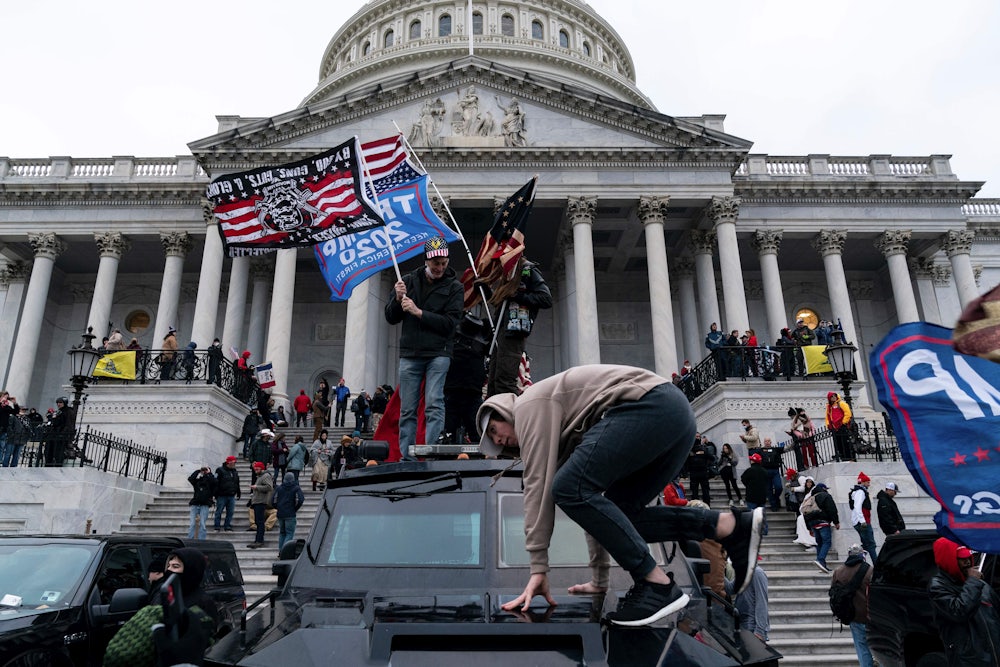In the last week, Marriott, Blue Cross Blue Shield, and Commerce Bank have each paused donations to congressional supporters of the Capitol riot. So have Amazon, Comcast, and GE. (Flaming a violent assault on Congress was apparently fine. But when that violent assault actually happens almost exactly as described? Well, that changes things!) Meanwhile, JPMorgan Chase and CitiGroup announced on Sunday their intentions to halt funding contributions to both Republican and Democratic campaigns for the foreseeable future and were joined soon afterward by AT&T, Dow, Facebook, UPS, and others. Everybody’s getting out of the pay-for-play game in D.C.—for now, at least.
Like last week’s corporate statements against President Trump’s riot incitement, these pledges to stop buying legislation and lawmakers in broad daylight also ring hollow. But there is something minimally interesting happening in the fallout: In response to the news that companies were turning off their money faucets, Lloyd Blankfein, the former chief executive of Goldman Sachs, ended up saying the quiet part loud about the influence of money in politics. “I would be very reluctant to threaten a legislator with a permanent breach over any single issue,” he told The New York Times, “recognizing we may need to work together on many other things that will be important to us in the future.” These campaign donations have always been transactions—a gift of cash in exchange for influence. That the companies have reverse-engineered their way into campaign finance reform—temporary though their penance may be—is only a further admission of how broken our system was long before January 6. The trick now is to force them to keep their money out of politics for good.
There is no ideology too odious for corporate money. As my colleague Osita Nwanevu wrote last week, corporations have always been completely comfortable contributing to candidates with a predilection for far-right politics that are openly white supremacist and anti-democracy. For example, North Carolina Congressman-elect Madison Cawthorn—whose myriad campaign scandals included an instance in which he posted a picture of Adolf Hitler’s Eagle Nest hideout with a caption referring to “the Führer”—out-raised Democratic challenger Moe Davis in PAC contributions at nearly a three-to-one rate. Among those whose PACs donated: UPS, Columbia Records, Wicked Weed Brewery, and Major League Baseball’s San Francisco Giants. Cawthorn pocketed these corporate funds on his way to an election victory in November, then used his position to instruct young conservatives in December that they should “Call your congressman and feel free, you can lightly threaten them and say, you know what, if you don’t start supporting election integrity, I’m coming after you. Madison Cawthorn is coming after you.” There are no surprises to be found here.
Even massive multibillion-dollar outfits, such as Facebook and Amazon, have adopted the practice of contributing to both Republicans and Democrats as a way to ensure they have an audience regardless of outcome. (Plus, as Nwanevu wrote, “Financial support for a campaign to resegregate the right to vote in this country cannot be ‘balanced out.’” This stuff doesn’t come out in the wash.) Opting out of that exchange for a few months or even an election cycle does not absolve these corporations of backing a throng of far-right members of Congress. Plus, the moment it’s deemed safe by their legal and P.R. departments to resume their donations, the machine will crank right back up.
But there are options available to the new Democratic-majority Congress that could help cement some of the changes that these companies have superficially made. Among those already adopted by various state and local governments is the idea of publicly funded elections.
Connecticut, following in the footsteps of Arizona and Maine, has been on this train for over a decade, having passed a series of sweeping election reform bills in 2005 and 2006. This resulted in the creation of what’s known as a Citizens’ Election Fund, which allowed candidates without extraordinary personal wealth to start campaigns of their own. The fund is credited with decreasing lobbyists’ influence over the legislature and has allowed more women and people of color to run for office. In Portland, Oregon, it helped break the cycle of unopposed mayoral elections.
These aren’t just necessary measures; they’re popular, too. In Minnesota, St. Cloud State University conducted a survey last October that found 82 percent of those polled want donations to be publicly disclosed, 55 percent oppose the Supreme Court’s ruling in Citizens United, and another 58 percent believe there is a need for partial public financing of political campaigns.
The hard work will come in convincing members of both sides of the aisle to effectively cut loose the financial safety nets that secure their repeated elections. But the public appetite, as well as the necessity for campaign finance reform, is clearly there. If the current insurrection backlash is going to produce anything close to a long-term fix, it will mean rethinking the electoral system that helped create last week’s riot. And that means not letting companies take themselves off the hook. Without real reform, they’ll gladly fund the next Cawthorn or Josh Hawley if it’ll help maintain corporate impunity. Who cares if a few people get killed in the process?
